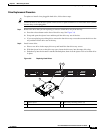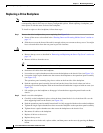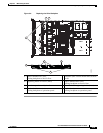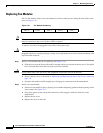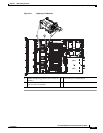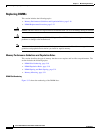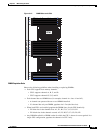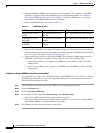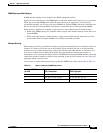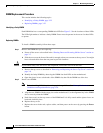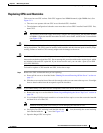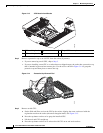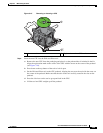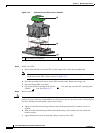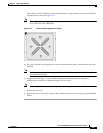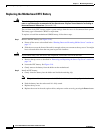
3-21
Cisco UCS C220 Server Installation and Service Guide
OL-25760-01
Chapter 3 Maintaining the Server
Installing or Replacing Server Components
DIMM Sparing and Rank Sparing
DIMM and rank sparing can be enabled in the BIOS configuration utility.
Sparing involves utilizing one of the DIMM pairs or rank pairs within each memory riser as a spare unit.
When any of the other DIMM pairs within the same memory riser experiences errors beyond a
pre-defined threshold, it fails over to the spare DIMM pair. Spared DIMMs and ranks are hidden from
the user and the OS so that the BIOS can migrate to a spare unit when it finds degrading DIMMs.
When sparing is enabled, the available system memory is lesser than the total installed memory.
• When using DIMM sparing, the available memory equals total installed memory minus the size of
spared DIMMs.
• When using rank sparing, available memory equals total installed memory minus the size of the
spared ranks. Rank size equals DIMM size divided by the number of ranks.
Memory Mirroring
When memory mirroring is enabled, the memory subsystem simultaneously writes identical data to two
channels. If a memory read from one of the channels returns incorrect data due to an uncorrectable
memory error, the system automatically retrieves the data from the other channel. A transient or soft
error in one channel does not affect the mirrored data, and operation continues unless there is a
simultaneous error in exactly the same location on a DIMM and its mirrored DIMM. Memory mirroring
reduces the amount of memory available to the operating system by 50% because only one of the two
populated channels provides data.
If you choose to enable memory mirroring, populate the DIMM slots in the order shown in Table 3-5.
Ta b l e 3-5 Memory Mirroring DIMM Population
Number of DIMMs
per CPU CPU 1 Population CPU2 Population
4 A1, B1; A2, B2 E1, F1; E2, F2
6 A1, B1; C1, D1; A2; B2 E1, F1; G1, H1; E2, F2
8 A1, B1; C1, D1; A2, B2; C2, D2 E1, F1; G1, H1; E2, F2; G2, H2



